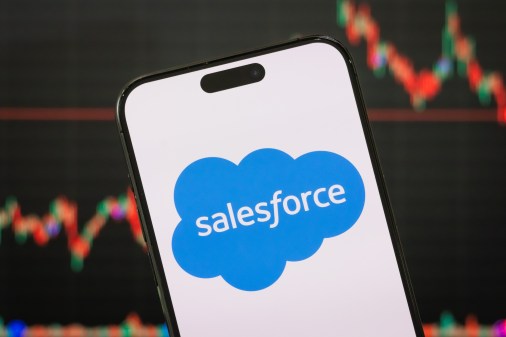The fruits of GSA’s $503M Salesforce contract are in reuse

Some of the biggest cost savings the General Services Administration expects from its recently launched governmentwide contract vehicle for Salesforce services are likely to come from agencies sharing and reusing application code that vendors have already developed for other federal customers, according to GSA officials.
As part of the agreement, officially dubbed the Salesforce Implementation, Integration and Support Services Blanket Purchase Agreement, applications and services developed by the six partner vendors on the five-year, $503 million contract will be uploaded to a collaboration portal called GSA Labs, where GSA is currently hosting applications it has developed for Salesforce for reuse.
GSA named Accenture, Acumen, Capgemini, Deloitte, Phase One and PricewaterhouseCoopers as initial partner vendors on the BPA.
[Read FedScoop’s coverage of the Salesforce BPA here: GSA inks blanket 5-year, $503M deal with Salesforce partners]
“We hope to increase that [hosting on GSA Labs] to other applications that are developed on the Salesforce platform from other agencies to really promote reuse in the federal community,” Megan Schmith, GSA’s director of enterprise application development and platform strategy, said during a Wednesday conference call with reporters. GSA has been using Salesforce since 2009, in which time its use of the customer relations management and cloud computing company’s services has bloomed from about 125 users to 17,000.
“We’ve really made it a point to share the knowledge of the wins and the losses that we’ve experienced, throughout our implementation, across the federal community,” Schmith said.
GSA Chief Information Officer David Shive said his agency has already seen savings of up to 80 percent on the reuse of Salesforce code rather than developing it from scratch in new contracts, and he expects that “will extend to other agencies” that use the BPA.
“This is great because it multiplies the investments we make using taxpayer dollars,” Shive said. Even Salesforce applications developed for agency customers outside the scope of the BPA can be shared on the GSA Labs portal. “This is providing an easy, seamless way for technology shops across the federal government to consume these types of service offerings and get the added benefit of sharing, reusing and extending that investment outwards,” he said.
[Read more: GSA — New software deal could save agencies millions]
And it’s all in line with the spirit of the Federal IT Acquisition Reform Act. “This aligns really well with FITARA for fragmented and federated agencies, and also is a best practice for leveraging investments across the entire federal government,” he said.
His colleague Mary Davie, assistant commissioner for GSA’s Office of Information Technology Services, also noted the harmony between the new vehicle and the law’s software licensing requirements to consolidate duplicative contracts and leverage enterprise agreements.
“This was a natural fit” with FITARA, Davie said. “We in ITS are always trying to build solutions that agencies can build once and use many [times].” It was also “an approved and selected initiative” of the FITARA enterprise software category team in accordance with the Office of Management and Budget’s December guidance on better software license management and procurement.
The broader hope with this BPA, the GSA officials said, is that it will stand as a working prototype for similar agreements with other IT services vendors, perhaps like the Microsofts of SAPs of the federal software world.
“What we’ve created here, we can create with the tools of other providers, not just Salesforce,” Shive said. “This will allow us to focus on a micro-market of services that are procured in support of Salesforce-type implementations…in order to develop a working prototype for system and creation BPAs that we can just replicate again and again.”
But that all depends on “agency interest and use,” Davie said. Salesforce was a low hanging fruit for this type of agreement because of its close to ubiquitous but fragmented use throughout government and because agencies were asking for a better way to buy Salesforce services before GSA began exploring the idea, she said.
“If agencies are raising their hands wildly like this group did, then it’s something we want to take seriously because we believe that we could really help,” Davie said.
As of Wednesday, GSA released an ordering guide for the SIISS BPA, hoping that agencies looking to procure new Salesforce services will leverage the BPA and GSA Labs for their needs.
Contact the reporter on this story via email Billy.Mitchell@FedScoop.com or follow him on Twitter @BillyMitchell89. For stories like this in your inbox every morning subscribe to the Daily Scoop here: fdscp.com/sign-me-on.






